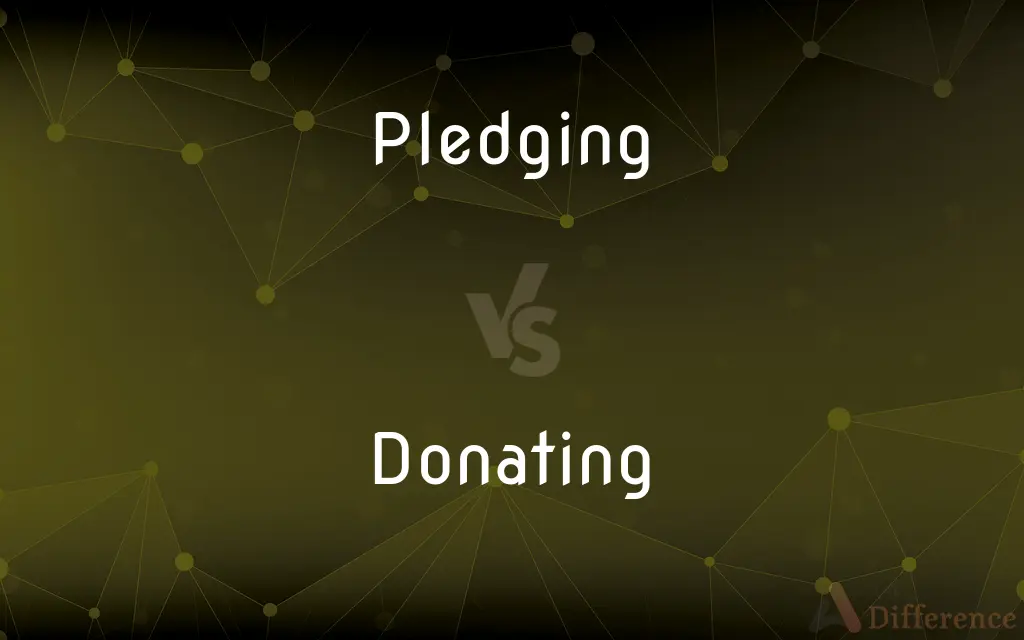Pledging vs. Donating — What's the Difference?
By Tayyaba Rehman & Urooj Arif — Published on October 14, 2024
Pledging involves committing to give a specific amount in the future, often for fundraising, while donating means providing money or goods to a cause or organization immediately.

Difference Between Pledging and Donating
Table of Contents
ADVERTISEMENT
Key Differences
Pledging is a promise to give a certain amount of money or resources to a cause at a future date. It's often used in fundraising campaigns where future funds are accounted for. Donating, on the other hand, involves immediately giving money, goods, or time to support a cause or organization.
Pledges can be conditional, depending on the achievement of specific goals or matching funds, which encourages more giving and engagement. Donations are typically unconditional contributions that immediately benefit the recipient without specific future conditions.
The process of pledging allows individuals or organizations to plan their giving, often resulting in larger amounts committed over time. Donations, especially spontaneous ones, are generally smaller but provide immediate support to the cause.
Pledging often involves a formal agreement or a statement of intent, which might include details like payment schedules. Donating is usually a straightforward action, requiring less planning and often accomplished with a single transaction.
Tax implications can differ: pledges might not be tax-deductible until the promised funds are actually paid, while donations are often deductible in the year they are made, providing immediate financial benefits to the donor.
ADVERTISEMENT
Comparison Chart
Definition
Committing to give a specific amount in the future.
Providing money or goods to a cause immediately.
Conditionality
Can be conditional on certain achievements.
Typically unconditional.
Timing
Funds or resources are promised for the future.
Immediate contribution of funds or resources.
Engagement
Involves planning and often a formal agreement.
Usually requires less planning, often spontaneous.
Tax Implications
Tax benefits apply when the pledged amount is paid.
Tax benefits are usually immediate.
Compare with Definitions
Pledging
Committing to donate a sum of money at a future date.
She's pledging $100 monthly to her favorite charity.
Donating
Giving money or goods to support a cause.
She donated $50 to the relief fund immediately.
Pledging
A promise made during fundraising campaigns.
His pledge helped the organization reach its fundraising goal.
Donating
An immediate contribution.
After the disaster, he donated blankets and food.
Pledging
Often conditional upon achieving goals.
The pledge was contingent on matching funds from another donor.
Donating
Often eligible for immediate tax deductions.
The donation was deducted from this year's taxes.
Pledging
Plans for future giving.
By pledging, they could budget their charitable giving for the year.
Donating
Typically unconditional support.
Their donation was given with no strings attached.
Pledging
Can involve a formal agreement.
They signed a pledge agreement for the next five years.
Donating
Can be a spontaneous act.
Moved by the story, they donated on the spot.
Pledging
A solemn binding promise to do, give, or refrain from doing something
Signed a pledge never to reveal the secret.
A pledge of money to a charity.
Donating
To present as a gift to a fund or cause; contribute.
Pledging
Something given or held as security to guarantee payment of a debt or fulfillment of an obligation.
Donating
(Chemistry) To provide (an electron or atom, for example) for combination with an acceptor.
Pledging
Delivery of goods or personal property as security for a debt or obligation
A loan requiring a pledge of property.
Donating
To make a contribution to a fund or cause.
Pledging
The contract or transaction stipulating or involving such delivery.
Pledging
To deposit as security; pawn.
Pledging
To accept as a prospective member of such an organization.
Common Curiosities
Can pledges be conditional?
Yes, pledges can be conditional upon certain achievements or matching funds.
What is pledging?
Pledging is committing to give a specific amount of money or resources to a cause at a future date.
What is donating?
Donating means giving money, goods, or time to support a cause or organization immediately.
How do tax implications differ between pledging and donating?
Pledged amounts may only be tax-deductible when paid, while donations are often deductible in the year made.
Can I change my mind after making a pledge?
This can depend on the terms of the pledge, but there is usually some flexibility.
How do pledging and donating differ in timing?
Pledging involves future commitments, while donating is an immediate action.
Do donations have to be monetary?
No, donations can include goods, services, or time.
What motivates people to pledge rather than donate immediately?
Pledging allows for future planning of financial contributions and can be tied to specific goals or conditions.
Are donations always immediate?
Yes, donations are immediate contributions to a cause.
How can one decide between pledging and donating?
Consider your financial situation, the cause's immediate needs, and whether you want to make a long-term commitment.
Is a formal agreement required for pledging?
Often, yes, especially for large or structured pledges.
Can both individuals and organizations make pledges or donations?
Yes, both can pledge or donate to causes they support.
Are all donations tax-deductible?
Not all; it depends on the recipient's tax-exempt status and the donor's tax jurisdiction.
Which is more beneficial to a charity, pledging or donating?
Both are beneficial, but donations provide immediate support, while pledges can help with long-term planning.
Is pledging more common for certain types of fundraising campaigns?
Yes, it's often used in capital campaigns or when large, long-term funding is sought.
Share Your Discovery

Previous Comparison
Alpha Kappa Alpha vs. Delta Sigma Theta Sorosity
Next Comparison
Right To Buy vs. Right To AcquireAuthor Spotlight
Written by
Tayyaba RehmanTayyaba Rehman is a distinguished writer, currently serving as a primary contributor to askdifference.com. As a researcher in semantics and etymology, Tayyaba's passion for the complexity of languages and their distinctions has found a perfect home on the platform. Tayyaba delves into the intricacies of language, distinguishing between commonly confused words and phrases, thereby providing clarity for readers worldwide.
Co-written by
Urooj ArifUrooj is a skilled content writer at Ask Difference, known for her exceptional ability to simplify complex topics into engaging and informative content. With a passion for research and a flair for clear, concise writing, she consistently delivers articles that resonate with our diverse audience.













































